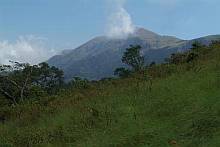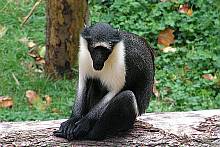Vanishing African wildlife threatens livelihoods
|
Africa's rich abundance of life seems inexhaustible, but growing pressure on animals and plants could lead to greater poverty, more wars and migration to other continents, experts warned.
From fish in Burkina Faso, to Ethiopian wild coffee, Kenyan forests and traditional medicine plants in the Democratic Republic of Congo, the continent's natural resources are being threatened by human activity and climate change, experts say.
"If Africa's systems degrade and human wellbeing becomes an issue, cycles of poverty, violence and wars will get worse," said John Donaldson of South Africa's National Biodiversity Institute (SANBI).
He was speaking on the sidelines of a conference in Cape Town that gathered over 300 policymakers, scientists and activists from 15 African countries and Germany to discuss research into the protection of plants and animals around the continent.
Surging populations, overuse of land, and climate change threaten to kill off creatures around Africa, where up to 15% of all species currently face extinction, the conference heard.
However, on a continent where economies depend heavily on natural resources for mining, agriculture and tourism, changing the behaviour of people to protect animal and plant life is a challenge.
"If you are really hungry and you don't know how to feed your children the next day, you don't care about biodiversity or anything else which isn't of instant importance to you," said Edward Linsenmair of the African conservation group Biota.
According to Donaldson, the key is to get governments and individuals to make long-term plans for the environment.
"With poor communities you have to understand the dynamics driving land use in the first place."
Deadly cocktail for long-term conservation
Jakob Fahr from the German University of Ulm gave an example from West Africa where Mount Nimba, teeming with diverse flora and fauna, represents a "deadly cocktail" for long-term conservation.
The mountain has been declared by the United Nations as a World Heritage in Danger. It straddles the borders of Côte d'Ivoire, Liberia, and Guinea and is home to threatened West African bats and frogs.
The threatened species live in an area with remarkable mineral wealth, which places the animals in even greater danger, said Fahr.
"Because of skyrocketing prices for base metals such as iron ore, they are currently being targeted by mining companies and this would result potentially in a major extinction," he said.
The mountain also provides a critical service to surrounding human communities, capturing water which is filtered by the forests still present on the slopes.
"So if you have an open-cast mine there you can easily imagine what tremendous and grave consequences that will have on water supply to surrounding communities," he said.
Vanishing animals and plants
In countries such as Ghana, where a long tradition of gold mining has already shown communities the devastation caused by vanishing animals and plants, locals are much more willing to say no to mining projects.
"The promise of jobs usually is of much more interest in a short-term perspective compared to what is being lost in the long term," said Fahr.
Across the continent scientists are trying to inform governments and communities about the impacts of their actions, and get them to implement environmentally-friendly policies.
Disappearing forests and arable land could have a profound effect on the world beyond Africa's borders.
"We are living in one world. If we are destroying a system of a whole continent we are the ones who will suffer greatly, especially Europe," said Linsenmair.
"Africa is before our door, we already have huge problems with refugees. In many cases these are refugees because there are not enough natural resources where they come from." – AFP
Source: Mail & Guardian














